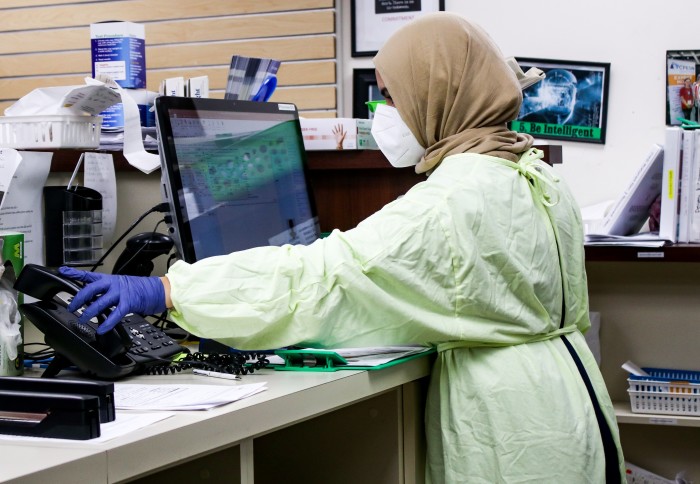

Swab tests on over 105,000 people as part of a major research study have shown that coronavirus infections are declining in England.
An interim report from the REACT programme, which includes results from home coronavirus tests taken between 13th and 24th November, shows that an estimated 0.96% of England’s population has the virus, or around 1 in 100 people.
This is roughly a 30% drop in the number of infections compared with previous findings, where more than 1 in 80 or 1.3% of people had the virus as of 2nd November.
We’re seeing a fall in infections at the national level and in particular across regions that were previously worst affected. Prof Paul Elliott Imperial College London
The research from Imperial College London and Ipsos MORI shows that the overall R number has also fallen to below 1, estimated at 0.88, meaning that the country’s epidemic is currently shrinking rather than growing.
Downward trends were seen across the majority of the country, including in previous hotspots in the North, and most age groups except those of school age, where there has been an increase. The results also highlight that the virus is having an uneven impact, with health workers, people living in large households and minority ethnic individuals having a higher risk of infection.
Professor Paul Elliott, director of the programme at Imperial, said: “Our robust data offer encouraging signs for England’s epidemic, where we’re seeing a fall in infections at the national level and in particular across regions that were previously worst affected. These trends suggest that the tiered approach helped to curb infections in these areas and that lockdown has added to this effect.
“As we approach a challenging time of year, it’s even more vital that through our actions and behaviours we all play our part in helping to keep the virus at bay.”
These findings from the REal-time Assessment of Community Transmission (REACT 1) programme are available in a pre-print report and will be submitted for peer-review.
Regional differences in coronavirus prevalence
The REACT 1 study is tracking current cases of COVID-19 in the community by testing more than 150,000 randomly-selected people each month over a two-week period. Volunteers take nose and throat swabs at home, which are then analysed in a laboratory by a technique called RT-PCR.
Out of 105,123 swabs analysed so far for this latest round of testing, 821 were positive, giving an estimated prevalence of 0.96% or 96 per 10,000 infected, after adjusting to ensure the figures are representative of England’s population.
Averaged over the period from the last round to the current round, the number of people becoming infected was found to be halving every 37 days, with a corresponding R of 0.88, meaning that each infected person passes the virus on to fewer than one other on average.
In most areas of the country prevalence has been falling, most notably in the North West and North East where the number of people testing positive dropped by half. While these areas were previously the worst affected, the figures show that the West Midlands now has the highest number of infections at 1.55% of the population. This area, alongside East Midlands and London, has also seen little change in infections since the previous round of testing. London also had the highest R at 0.95, while the lowest R was found in the North West and North East (0.76 and 0.78, respectively).
Demographic variations
While previously all age groups were experiencing a rise in infections, now most are seeing a fall, with the exception of children between the ages of 5 and 17 where positive tests are increasing. This trend could be linked to schools remaining open during the current lockdown, in contrast with the first national lockdown, the researchers suggest. In those aged 13-17, the prevalence is now over 2% or 1 in 50 testing positive.
REACT is one of a number of studies that are feeding into decision-making and helping to ensure that public health measures are based on robust, current evidence. Prof Steven Riley Imperial College London
This round has also seen disproportionate effects on certain groups of people. Those living in large households of 6 or more were around twice as likely to test positive as people living alone or with one other person.
Ethnic minorities were also more likely to have the virus compared with white people, with Asian individuals having the highest risk. There was also a link with deprivation where people from the poorest areas had the highest number of infections. Together these trends suggest that inequalities could be contributing to the virus spreading more in certain communities.
Professor Steven Riley, study author and Professor of Infectious Disease Dynamics at Imperial, said: “REACT is one of a number of studies that are feeding into decision-making and helping to ensure that public health measures are based on robust, current evidence.
“As we approach the end of lockdown, we need to keep monitoring the situation closely to spot any changes in trends that could arise from a loosening of restrictions, enabling a swift response to prevent further escalation of infections.”
Health and Social Care Secretary Matt Hancock said: “Thanks to the huge efforts of the public over the last few weeks we have been able to get the virus better under control to keep our NHS open. This latest data shows we must maintain our resolve and we cannot afford to take our foot off the pedal just yet despite the very encouraging fall in cases and advances in vaccines.
“The next few weeks and months are the busiest time of year for our NHS, so it’s vital we all continue to follow new local restrictions, wash our hands, wear a face covering and observe social distancing.”
Tracking the progress of the epidemic
The REACT programme is a series of studies that are monitoring how the virus is spreading across the country. Commissioned by the Department of Health and Social Care, it is being carried out in partnership with Ipsos MORI and Imperial College Healthcare NHS Trust.
Kelly Beaver, Managing Director - Public Affairs at Ipsos MORI said: “The REACT study programme has processed over one million tests as we track in real-time the prevalence of COVID-19 across England. We’re incredibly grateful to all those members of the public who’ve taken part, who have contributed to this vitally important study.”
Article text (excluding photos or graphics) © Imperial College London.
Photos and graphics subject to third party copyright used with permission or © Imperial College London.
Reporter

Justine Alford
Institute of Global Health Innovation

Contact details
Tel: +44 (0)20 7594 1484
Email: j.alford@imperial.ac.uk
Show all stories by this author



